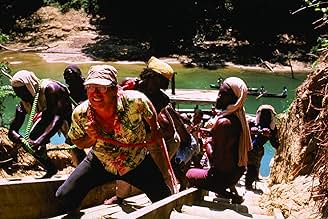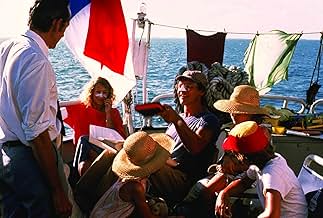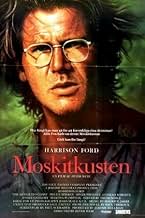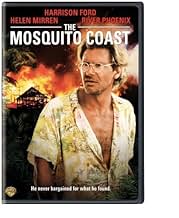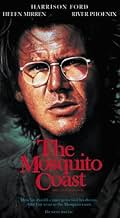एक आविष्कारक अपने शहरी जीवन ठुकराता है और अपने परिवार को मध्य अमेरिका के जंगलों में एक आदर्शलोक (यूटोपिया) बनाने के लिए ले जाता है.एक आविष्कारक अपने शहरी जीवन ठुकराता है और अपने परिवार को मध्य अमेरिका के जंगलों में एक आदर्शलोक (यूटोपिया) बनाने के लिए ले जाता है.एक आविष्कारक अपने शहरी जीवन ठुकराता है और अपने परिवार को मध्य अमेरिका के जंगलों में एक आदर्शलोक (यूटोपिया) बनाने के लिए ले जाता है.
- पुरस्कार
- 1 जीत और कुल 3 नामांकन
Alice Heffernan-Sneed
- Mrs. Polski
- (as Alice Sneed)
फ़ीचर्ड समीक्षाएं
The Mosquito Coast is an odd film. It attempts to talk about issues which are important and which few films address, fails to communicate them clearly, yet isn't sucked into the maelstrom of moralizing and sententiousness that films like this almost inevitably enter. Instead, it occupies some sort of odd middle ground of ambiguity and murkiness. One gets the feeling that the film is a lot like the Fox family: they know they're going upstream but they have no specific destination, and some of them really aren't sure why they're going there in the first place.
I felt from the very beginning that the film failed to define its ideals or set a sense of clear direction. Harrison Ford, in a performance which I found unconvincing (perhaps because of the inability of the film to articulate what motivated him), rambles on about everything from the Japanese to nuclear war. There's a large difference between subtlety, i.e. not spelling things out for the viewer, and incoherence. This was incoherent. We know that he's unhappy with America, but I don't know what he's really looking for, what motivates him, etc.. Maybe he doesn't know. But if that's the case, it should be made clear.
A good example of how this plays out is his attempt to bring ice to the "noble savages." Why does he do this? Because "ice is civilization." But why does he want to bring them civilization? It seemed to me that civilization was something he was having a lot of problems with. I assume that the novel explained this more clearly and the film failed to translate properly. He of course stated earlier in the film that the savages would probably think ice a sort of jewel. So? Why does this matter? Is he looking for lost innocence?
Then later in the film "Mother" says she wishes to go to Mr. Haddy's place. He responds "And live like savages?" I can only assume that he wishes to establish some sort of elementary civilization where a small community lives in peace and harmony. Or perhaps he's just looking to withdraw from everyone, as his spurning of Mr. Haddy's gifts would show. Also, a possible literary reference is the name of their craft, Victory, which is the name of a very dull Joseph Conrad novel about a man who withdraws from life and goes to live on an island. Extreme misanthropy? Unlikely.
A possible light at the end is his talk about man not being made to walk upright. Is he looking for some sort of return to primal existence? But then why invent air conditioning in Geronimo? It all adds up to a very disorganized mess, both in Mr. Fox's head, and on screen. The Mosquito Coast is like a puzzle that still has all the pieces, but rather than fit them together, Weir just threw them all in the box and let us look at them.
I felt from the very beginning that the film failed to define its ideals or set a sense of clear direction. Harrison Ford, in a performance which I found unconvincing (perhaps because of the inability of the film to articulate what motivated him), rambles on about everything from the Japanese to nuclear war. There's a large difference between subtlety, i.e. not spelling things out for the viewer, and incoherence. This was incoherent. We know that he's unhappy with America, but I don't know what he's really looking for, what motivates him, etc.. Maybe he doesn't know. But if that's the case, it should be made clear.
A good example of how this plays out is his attempt to bring ice to the "noble savages." Why does he do this? Because "ice is civilization." But why does he want to bring them civilization? It seemed to me that civilization was something he was having a lot of problems with. I assume that the novel explained this more clearly and the film failed to translate properly. He of course stated earlier in the film that the savages would probably think ice a sort of jewel. So? Why does this matter? Is he looking for lost innocence?
Then later in the film "Mother" says she wishes to go to Mr. Haddy's place. He responds "And live like savages?" I can only assume that he wishes to establish some sort of elementary civilization where a small community lives in peace and harmony. Or perhaps he's just looking to withdraw from everyone, as his spurning of Mr. Haddy's gifts would show. Also, a possible literary reference is the name of their craft, Victory, which is the name of a very dull Joseph Conrad novel about a man who withdraws from life and goes to live on an island. Extreme misanthropy? Unlikely.
A possible light at the end is his talk about man not being made to walk upright. Is he looking for some sort of return to primal existence? But then why invent air conditioning in Geronimo? It all adds up to a very disorganized mess, both in Mr. Fox's head, and on screen. The Mosquito Coast is like a puzzle that still has all the pieces, but rather than fit them together, Weir just threw them all in the box and let us look at them.
Someone once said that ignorance is bliss; and if you follow through the reasoning process that leads to that conclusion, you discover that it is, indeed, true. Another way of saying it would be, that the less you know, the happier you are likely to be; kind of a `what you don't know can't hurt you' perspective, but true, nevertheless. Conversely then, what can be said about knowledge? About knowing too much? Can genius, for example, be equated with a life of torment? Can knowing-- and more precisely, understanding-- too much bring about anguish and unhappiness? The answer to that , of course, cannot be absolute, for there are a number of variables that must first be factored in, one of the most prevalent being that thin line that separates the true genius from madness, and how close to which side of that line the individual in question resides. It's a situation examined in depth by director Peter Weir, in his riveting, thought provoking drama, `The Mosquito Coast,' starring Harrison Ford, Helen Mirren and River Phoenix.
Allie Fox (Ford) is a family man; he has a devoted wife, `Mother (Mirren),' and four children, the eldest of whom, Charlie (Phoenix), thinks his dad is a genius. Which he is. Allie Fox is an inventor who believes it's man's job to tinker with an unfinished world and make it work. He is also a true individual, the epitome of the man who marches to his own drum-- and in his case, his drum is the `only' one he will march to. He sees such potential in everything around him, but he also sees that very same potential being wasted at every turn by seemingly everyone, from the average guy just trying to make a living, to a Corporate America he sees as the impetus that has already begun to destroy the nation. All around him he sees a country and a people that has lost that spirit that made America strong; he sees ruin and decay in everything: In the lack of quality in any and all manufactured goods, and in the apathy of the acquiescent consumer. And he's had enough. Refusing to stand by and watch America die, he packs up and moves his family to a remote section of a jungle in Central America, near the coast of La Moskitia; and it is there that he discovers a land, that to him, is paradise-- and where he also encounters the demons that plague those who know too much, and feel too deeply.
Working from an intelligent and penetrating screenplay by Paul Schrader (adapted from the novel by Paul Theroux), Weir delivers a thoroughly engrossing character study that parallels Werner Herzog's 1972 masterpiece, `Aguirre, The Wrath of God,' inasmuch as it examines the effects of self-perceived omnipotence in an individual driven to extreme measures by a singular quest for power and autonomy (albeit in different times and with different motives). Allie Fox, like Don Lope de Aguirre, becomes a victim of his own obsession, consequently victimizing those around him, as well, by losing sight of his own ideals and getting swept away in the current of a distorted sense of purpose. Allie leaves an environment he perceives as defective for one that is ultimately equally flawed-- that being the environs within his own mind. All of which is hauntingly presented by Weir, aided by John Seale and Maurice Jarre, whose cinematography and score, respectively, helps to create the atmosphere that so effectively underscores the drama of the story.
As Allie Fox, Harrison Ford gives a performance that is one of his best and most powerful ever, affecting a commanding presence that dominates virtually every scene-- so compelling that his presence is felt even when he is absent from the screen. This isn't a character you are going to like, necessarily; and yet you are going to care about him, because there's something in him that reflects and addresses concerns that are universal, which makes Allie someone to whom many in the audience will be able to relate and identify. He's the man who believes that he truly `can' be an island unto himself, and beyond his personal peccadilloes, that is the kind of strength that demands admiration; for at the same time, it enables forgiveness. It's a solid portrayal of a man at cross purposes with himself, who realizes to some extent what he is doing, yet adamantly refuses to back down. And this is the man Ford brings to life so vividly; he's convincing, and his Allie Fox is disconcertingly real.
Helen Mirren also turns in a memorable performance as Allie's devoted wife, whom he calls `Mother.' Mirren says more without dialogue-- through a subtle expression, or even the merest glance-- than most actors do with a limitless number of words. And it's her moments of silence that are some of the most telling of the film, while at the same time adding strength to the lines she does recite. In the end, Mirren creates a character who chooses her words well, then uses them wisely-- and it's a portrayal that is, without question, one of the strengths of the film. In the way Mother looks at Allie, Mirren conveys that love and absolute loyalty that makes everything they do believable. There is complete trust there, which you can feel when, standing in her kitchen, for example, she gives a final glance at the dishes piled high in the sink; a glance at the life she's leaving behind to follow her husband. And she's happy. In it's simplicity and brevity, it's a powerful scene that says so much about who she is, and who `they' are. And Mirren makes it work beautifully.
Phoenix does a solid job, too, providing the narrative of the film as Charlie. He is perfectly cast as Ford's son, and he succeeds in giving `The Mosquito Coast' that sense of reflection and perspective that makes it a truly memorable, and emotionally involving, film. 9/10.
Allie Fox (Ford) is a family man; he has a devoted wife, `Mother (Mirren),' and four children, the eldest of whom, Charlie (Phoenix), thinks his dad is a genius. Which he is. Allie Fox is an inventor who believes it's man's job to tinker with an unfinished world and make it work. He is also a true individual, the epitome of the man who marches to his own drum-- and in his case, his drum is the `only' one he will march to. He sees such potential in everything around him, but he also sees that very same potential being wasted at every turn by seemingly everyone, from the average guy just trying to make a living, to a Corporate America he sees as the impetus that has already begun to destroy the nation. All around him he sees a country and a people that has lost that spirit that made America strong; he sees ruin and decay in everything: In the lack of quality in any and all manufactured goods, and in the apathy of the acquiescent consumer. And he's had enough. Refusing to stand by and watch America die, he packs up and moves his family to a remote section of a jungle in Central America, near the coast of La Moskitia; and it is there that he discovers a land, that to him, is paradise-- and where he also encounters the demons that plague those who know too much, and feel too deeply.
Working from an intelligent and penetrating screenplay by Paul Schrader (adapted from the novel by Paul Theroux), Weir delivers a thoroughly engrossing character study that parallels Werner Herzog's 1972 masterpiece, `Aguirre, The Wrath of God,' inasmuch as it examines the effects of self-perceived omnipotence in an individual driven to extreme measures by a singular quest for power and autonomy (albeit in different times and with different motives). Allie Fox, like Don Lope de Aguirre, becomes a victim of his own obsession, consequently victimizing those around him, as well, by losing sight of his own ideals and getting swept away in the current of a distorted sense of purpose. Allie leaves an environment he perceives as defective for one that is ultimately equally flawed-- that being the environs within his own mind. All of which is hauntingly presented by Weir, aided by John Seale and Maurice Jarre, whose cinematography and score, respectively, helps to create the atmosphere that so effectively underscores the drama of the story.
As Allie Fox, Harrison Ford gives a performance that is one of his best and most powerful ever, affecting a commanding presence that dominates virtually every scene-- so compelling that his presence is felt even when he is absent from the screen. This isn't a character you are going to like, necessarily; and yet you are going to care about him, because there's something in him that reflects and addresses concerns that are universal, which makes Allie someone to whom many in the audience will be able to relate and identify. He's the man who believes that he truly `can' be an island unto himself, and beyond his personal peccadilloes, that is the kind of strength that demands admiration; for at the same time, it enables forgiveness. It's a solid portrayal of a man at cross purposes with himself, who realizes to some extent what he is doing, yet adamantly refuses to back down. And this is the man Ford brings to life so vividly; he's convincing, and his Allie Fox is disconcertingly real.
Helen Mirren also turns in a memorable performance as Allie's devoted wife, whom he calls `Mother.' Mirren says more without dialogue-- through a subtle expression, or even the merest glance-- than most actors do with a limitless number of words. And it's her moments of silence that are some of the most telling of the film, while at the same time adding strength to the lines she does recite. In the end, Mirren creates a character who chooses her words well, then uses them wisely-- and it's a portrayal that is, without question, one of the strengths of the film. In the way Mother looks at Allie, Mirren conveys that love and absolute loyalty that makes everything they do believable. There is complete trust there, which you can feel when, standing in her kitchen, for example, she gives a final glance at the dishes piled high in the sink; a glance at the life she's leaving behind to follow her husband. And she's happy. In it's simplicity and brevity, it's a powerful scene that says so much about who she is, and who `they' are. And Mirren makes it work beautifully.
Phoenix does a solid job, too, providing the narrative of the film as Charlie. He is perfectly cast as Ford's son, and he succeeds in giving `The Mosquito Coast' that sense of reflection and perspective that makes it a truly memorable, and emotionally involving, film. 9/10.
Harrison Ford is often described as a movie star rather than an actor, but "The Mosquito Coast" easily disproves that (actually, so does "Blade Runner", but I digress). It's a fevered performance on which the whole film rests. Easily worth a watch.
But it also demands a lot from the audience. For one, there's an undercurrent of dread that's there right from the start and it's hard to watch Ford's mercurial character drag his family to the far ends of the jungle essentially to reboot civilization (a myopic one, at that). All I could think of was my family in that situation (hell, no).
I'm not going to lie, this is a hard movie, rife with misfortune; on occasions shocking, infuriating and exhausting. But I was glued to my seat until the very end, primarily because of Ford's deteriorating mental state. That's a house of horrors unto itself. This is a well-directed movie but man if it's not wearing.
But it also demands a lot from the audience. For one, there's an undercurrent of dread that's there right from the start and it's hard to watch Ford's mercurial character drag his family to the far ends of the jungle essentially to reboot civilization (a myopic one, at that). All I could think of was my family in that situation (hell, no).
I'm not going to lie, this is a hard movie, rife with misfortune; on occasions shocking, infuriating and exhausting. But I was glued to my seat until the very end, primarily because of Ford's deteriorating mental state. That's a house of horrors unto itself. This is a well-directed movie but man if it's not wearing.
I can almost guarantee that anyone who has seen 'The Mosquito Coast', then looked at the subject line of this review, thinks I'm crazy. The truth is that this film is deeply flawed and undeniably weak in many regards, but it had a quality I cannot describe. This is the only film I have ever seen that, despite many shortcomings, manages to come out of the storm relatively unscathed, and become an unforgettable, almost haunting, movie.
The production values are immaculate. Peter Weir's direction is excellent, and is in top form here. He has crafted a thick shell that blocks the flaws from coming up to the surface, an indescribable feat that very few directors have accomplished. The musical score is good, not outstanding, but it's fitting, and surprisingly subtle. There is only about six minutes out of the entire film that has musical accompaniment, which makes for a very unique experience, and not necessarily a bad one. The tropical cinematography is dazzling, and the decision to shoot on location in Belize instead of on a studio back lot really paid off, contributing greatly to the film's success.
As good as the mentioned characteristics are, nothing is as good as the acting, especially that from the two leads: Harrison Ford and River Phoenix. Prior to this, Ford had made a name for himself with big budget action roles, with several failed attempts at drama (Hanover Street being the best example of that). It wasn't until 1985's 'Witness' (which Peter Weir also directed, that Ford was taken seriously as an all around actor. Personally I think Ford's performance here greatly overshadowed his work in 'Witness', and is a career best for him, even in the light of 'Regarding Henry' and 'Presumed Innocent', both made after his. He takes the character of Allie Fox, and moulds him into a selfish, driving maniac, blind to the wishes of others, only caring for himself. Phoenix, on the other hand, deserves even more acclaim, for several reasons. For one, this was only his third film, after 1985's 'Explorers', and 'Stand by Me', made right before this. Secondly, he was only 15 at the time of the shoot, and had little acting experience, yet he easily out acted most of his co-stars. Though his performance wasn't quite as refined as Ford's was, he still reached a level of near perfection and set the stage for a glorious, and ultimately tragic, career.
The story is one of utter genius, one of the few original ones popping up in an industry full of sequels, remakes and rip offs. Based on the 1981 bestseller by Paul Theroux, and co-starring Helen Mirren, 'The Mosquito Coast' deserves a place among the best films of the 80's.
But wait, I'm not done. Despite a great exterior, deep inside the movie is troubled. It's as if director Weir pushed all the movie's problems deep down under the surface, then piled layer after layer of... something, on top of it, hiding them from the clueless audience. My main problem with the movie is that it yearns to break away from it's literary roots, a problem that could've been easily avoided had the right script come along. Entire conversations are lifted from the text, and there isn't a single line that doesn't have an equal counterpart in the novel. For me this got extremely tedious as, hours before popping in the tape for a second viewing, I had finished the book, and the two are much too similar.
Another problem I have with it is that the scenes are much too short, with none of them running over about a minute and a half. An obvious result of this is that many subplots remain unresolved, and several concepts are hinted at, but go without further explanation, making for a confusing story. If the screenwriter had put a little more effort into making the film different than the book, with new scenes, we would have seen a much better end product.
A third, albeit a smaller one, is that the production team apparently spent too much time making sure that the movie would get a PG rating, though it would've been much better had it gotten an R, or even a PG-13 rating. That would've allowed Ford a little more breathing room to tweak his character, possibly allowing Allie to become less sympathetic, more of a madman.
I can't think of much more worth saying to put in this review, so I'll end it with this note: see the movie, even if you've read the book, but don't do the two back to back.
The production values are immaculate. Peter Weir's direction is excellent, and is in top form here. He has crafted a thick shell that blocks the flaws from coming up to the surface, an indescribable feat that very few directors have accomplished. The musical score is good, not outstanding, but it's fitting, and surprisingly subtle. There is only about six minutes out of the entire film that has musical accompaniment, which makes for a very unique experience, and not necessarily a bad one. The tropical cinematography is dazzling, and the decision to shoot on location in Belize instead of on a studio back lot really paid off, contributing greatly to the film's success.
As good as the mentioned characteristics are, nothing is as good as the acting, especially that from the two leads: Harrison Ford and River Phoenix. Prior to this, Ford had made a name for himself with big budget action roles, with several failed attempts at drama (Hanover Street being the best example of that). It wasn't until 1985's 'Witness' (which Peter Weir also directed, that Ford was taken seriously as an all around actor. Personally I think Ford's performance here greatly overshadowed his work in 'Witness', and is a career best for him, even in the light of 'Regarding Henry' and 'Presumed Innocent', both made after his. He takes the character of Allie Fox, and moulds him into a selfish, driving maniac, blind to the wishes of others, only caring for himself. Phoenix, on the other hand, deserves even more acclaim, for several reasons. For one, this was only his third film, after 1985's 'Explorers', and 'Stand by Me', made right before this. Secondly, he was only 15 at the time of the shoot, and had little acting experience, yet he easily out acted most of his co-stars. Though his performance wasn't quite as refined as Ford's was, he still reached a level of near perfection and set the stage for a glorious, and ultimately tragic, career.
The story is one of utter genius, one of the few original ones popping up in an industry full of sequels, remakes and rip offs. Based on the 1981 bestseller by Paul Theroux, and co-starring Helen Mirren, 'The Mosquito Coast' deserves a place among the best films of the 80's.
But wait, I'm not done. Despite a great exterior, deep inside the movie is troubled. It's as if director Weir pushed all the movie's problems deep down under the surface, then piled layer after layer of... something, on top of it, hiding them from the clueless audience. My main problem with the movie is that it yearns to break away from it's literary roots, a problem that could've been easily avoided had the right script come along. Entire conversations are lifted from the text, and there isn't a single line that doesn't have an equal counterpart in the novel. For me this got extremely tedious as, hours before popping in the tape for a second viewing, I had finished the book, and the two are much too similar.
Another problem I have with it is that the scenes are much too short, with none of them running over about a minute and a half. An obvious result of this is that many subplots remain unresolved, and several concepts are hinted at, but go without further explanation, making for a confusing story. If the screenwriter had put a little more effort into making the film different than the book, with new scenes, we would have seen a much better end product.
A third, albeit a smaller one, is that the production team apparently spent too much time making sure that the movie would get a PG rating, though it would've been much better had it gotten an R, or even a PG-13 rating. That would've allowed Ford a little more breathing room to tweak his character, possibly allowing Allie to become less sympathetic, more of a madman.
I can't think of much more worth saying to put in this review, so I'll end it with this note: see the movie, even if you've read the book, but don't do the two back to back.
Some of the other reviews summarize this pretty well. The Mosquito Coast details flawlessly the grotesque decomposition of a good and true man. Harrison Ford's Allie is driven insane by his own intelligence and inability to control his ego. Even more remarkable and disquieting is the fact that this is based on a true story. In some ways, Allie reminds me of Dr. Mobius from Forbidden Planet. But the demons Allie conjures up are far more grotesque and deadly than anything from even Mobius' warped imagination. I conclude that this is a true piece of art and science -- magnificently crafted from beginning to end -- and I will NEVER voluntarily watch it again.
The Life and Times of Harrison Ford
The Life and Times of Harrison Ford
Take a look back at Harrison Ford's movie career in photos.
क्या आपको पता है
- ट्रिवियाWhile building the town set in Belize, the crew unearthed an ancient Mayan temple. It notified the Belize government, which declared the site an important historical find.
- गूफ़The "Ice from Fire" technique for using heat, ammonia and hydrogen was actually invented in 1824 by the English scientist Michael Faraday.
- भाव
Emily Spellgood: [to Charlie] I think about you when I go to the bathroom.
- साउंडट्रैकClap Your Hands
Words and Music by Gary Johnson
Performed by Grace Gospel Primary School Choir
टॉप पसंद
रेटिंग देने के लिए साइन-इन करें और वैयक्तिकृत सुझावों के लिए वॉचलिस्ट करें
- How long is The Mosquito Coast?Alexa द्वारा संचालित
- Who are the three men that Allie meets in the remote village and who come to Jeronimo later? Why were they hiding when Allie and his party arrived?
- Early in the film Allie presents his machine to a farmer but the farmer scoffs and rejects it. Why didn't he want it?
- Why did Allie tell the armed men that his village was infested with ants?
विवरण
- रिलीज़ की तारीख़
- कंट्री ऑफ़ ओरिजिन
- भाषाएं
- इस रूप में भी जाना जाता है
- La costa de los mosquitos
- फ़िल्माने की जगहें
- उत्पादन कंपनियां
- IMDbPro पर और कंपनी क्रेडिट देखें
बॉक्स ऑफ़िस
- बजट
- $2,50,00,000(अनुमानित)
- US और कनाडा में सकल
- $1,43,02,779
- US और कनाडा में पहले सप्ताह में कुल कमाई
- $1,10,313
- 30 नव॰ 1986
- दुनिया भर में सकल
- $1,43,02,779
- चलने की अवधि1 घंटा 57 मिनट
- रंग
- ध्वनि मिश्रण
- पक्ष अनुपात
- 1.85 : 1
इस पेज में योगदान दें
किसी बदलाव का सुझाव दें या अनुपलब्ध कॉन्टेंट जोड़ें





